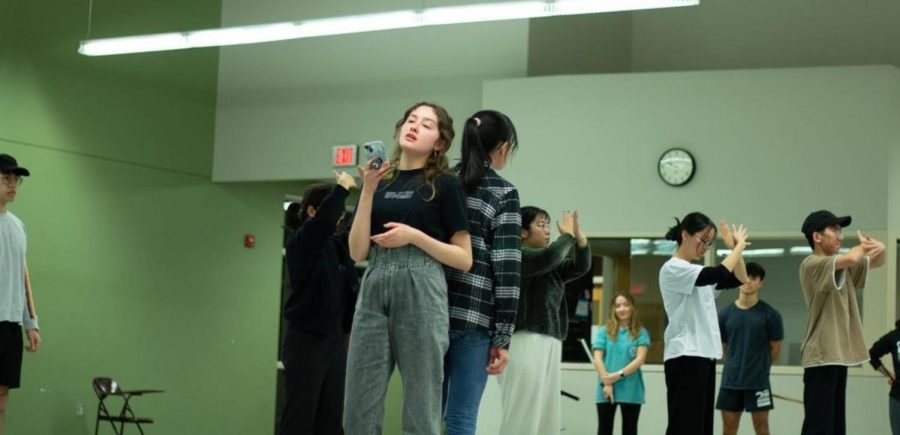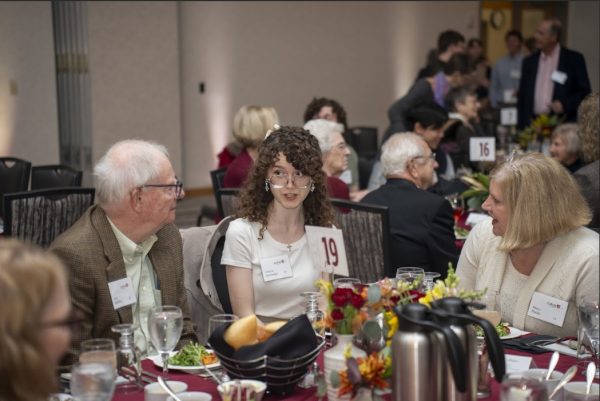Rangeela performers are ready to share the show
Photo from china_rangeela on Instagram
The China Act has components of both music and dance to showcase Chinese culture.
Students involved in this year’s Rangeela — a student performance dedicated to showcasing international cultures — are excited to exhibit their hard work in their performances on Thursday and Friday, Feb. 23 and 24, according to Bethany Gambler, a senior participating in the Indonesia and Thailand acts.
This week’s show is the first time since 2020 that Rangeela has been an in-person performance, meaning only current fourth-year students have had the opportunity to watch Rangeela live before. This week is also the debut show of Rangeela as a student organization. Previously, Rangeela was managed by the Center for Intercultural Student Development (CISD) but according to previous Chimes reporting, the CISD no longer had the staff capacity to run the event. Students took it upon themselves to continue the tradition.
This year, over 200 students are participating in Rangeela, according to Su Ji Lim, senior and current Rangeela president.
According to Lim, the acts themselves do not have any “stark differences” from previous years. Rather, Lim told Chimes, “[the] one difference that I see from an organizational point of view is in the amount of administrative support we receive.”
This year, as in past years, the Rangeela committee conducted checks of the different acts to evaluate “synchronization, group cohesion, clear formations, energy and facial expressions” in order to “help all the acts represent their cultures in the best quality that they can,” according to Lim.
However, the makeup of this committee is different this year due to the change in organizational structure. While in the past the committee included both students and staff members, this year the committee was all students, according to Gambler.
Additionally, the timing of rehearsals and performances changed. In 2020, Gambler said that the rehearsal process “was very accelerated.” Before this year, students rehearsed during the former interim period in January. There were approximately six weeks between the beginning of rehearsals during interim and the performance in February. In Gambler’s experience, rehearsals happened three times a week for two to three hours.
This year, auditions occurred in September and rehearsals happened approximately once a week for an hour from September until show week in February. “It’s been a lot slower paced than freshman year,” Gambler said, and therefore, “you spend a good chunk of practice having to, like, relearn or clean up things you did last week,” which can be frustrating and challenging, according to Gambler.
One of the challenges Middle East act leader and junior Jonathan Umran faced was a lack of experience. Neither he nor his fellow act leaders “knew how to dance, none of us know how to put together an act,” he said. Umran reached out to a family friend who was a wedding planner in Lebanon and asked if he would be willing to help their act learn a traditional wedding dance. The friend agreed and has helped with “the vision of the whole act,” Umran told Chimes.
Changes in leadership between last semester and this one were a challenge for the China act, according to China act leader David Quain, but they figured it out, and Evan Hsu stepped into the role of act co-leader.
Leading or participating in an act requires a tremendous amount of work and time. “It is a very long process. Every one of us, not just the act leaders but all the performers … put so much time in it,” Quain said.
Gambler also mentioned other people, like ushers, emcees, custodians and tech crew members with gratitude. “There’s so many people that have to put in the work to make the show what it is,” she said.
Despite the challenges, Gambler, Umran and Quain are excited for the show.
“I’m so proud of how much effort and practice my group has put in. I’m so excited for us to just be able to share that,” Umran said.









